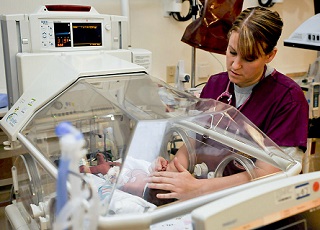Center for Health Workforce Studies Finds an Increasing Number of RN Graduations in New York
ALBANY, N.Y. (June 29, 2015) -- In 2014, registered nurse (RN) graduations in the state grew by 6 percent over 2013, driven primarily by an increase in the number of baccalaureate nursing (BSN) graduates, while licensed RNs who continued their education to obtain a baccalaureate degree in nursing (BSN completers) made up a growing share of BSN graduates.According to a recently released report from the University at Albany’s Center for Health Workforce Studies (CHWS), the total number of RN graduations in the state has more than doubled since 2002.
The report is based on an annual survey of deans and directors of New York’s RN education programs to better understand trends in the production of RNs in the state and the availability of jobs upon graduation. In 2014, ADN graduates declined slightly compared to 2013, while the number of BSN graduates increased by 12 percent over the same time period. For the first time, BSN graduates surpassed ADN graduates in 2014.
 |
|
The number of RN graduates in 2014 grew by nearly 6 percent over the number of 2013 graduates, according to a CHWS report.
|
A recent federal report indicated that nursing supply in New York will exceed nursing demand by 2025, although there continues to be a maldistribution of RNs at regional and local levels. The report also acknowledged -that the transformation of the health care delivery system will affect future demand for RNs.
“It will be important to understand the use of RNs in emerging models of care in ambulatory settings.” stated Dr. Robert Martiniano, senior program manager at CHWS. “While RNs may be logical candidates to work in clinical titles, they could also play key roles in the oversight and delivery of care coordination services.”
Among the findings:
• The number of RN graduates in 2014 grew by nearly 6 percent over the number of 2013 graduates. The growth was driven entirely by graduates of BSN programs.
• BSN completers made up a growing share of RN graduates from New York RN education programs. Since 2007 there has been a steady increase in the number of graduates from BSN completer programs and, as a result, BSN completers account for an increasing percentage of BSN graduates and total RN graduates. In 2014 BSN completers accounted for 36 percent of total BSN graduates and 19 percent of overall RN graduates.
• A slightly higher percentage of deans and directors reported “many jobs” for new RN graduates in 2014 compared with 2013, especially for BSN-prepared RNs. A higher percentage of deans and directors of BSN programs reported a stronger job market for their graduates in 2014 than deans and directors of ADN programs.
“Monitoring the production of RNs is part of a larger effort to understand New York’s health care workforce,” noted CHWS Director Dr. Jean Moore. “It is important to routinely assess both the production of RNs and the new RN job market to help us understand any potential gaps between the supply of and demand for RNs in New York.”
Find the full report on the CHWS website.
About the Center for Health Workforce Studies
The Center for Health Workforce Studies (CHWS)—established in 1996 at the School of Public Health, University at Albany—is a not-for-profit research organization whose mission is to provide timely, accurate information and conduct policy-relevant research about the health workforce. The Center’s work assists health, professional, and educational organizations, policy makers, planners, and other stakeholders to understand issues related to the supply, demand, distribution, and use of health workers.
![]() For more news, subscribe to UAlbany's RSS headline feeds
For more news, subscribe to UAlbany's RSS headline feeds
A comprehensive public research university, the University at Albany-SUNY offers more than 120 undergraduate majors and minors and 125 master's, doctoral and graduate certificate programs. UAlbany is a leader among all New York State colleges and universities in such diverse fields as atmospheric and environmental sciences, business, education, public health,health sciences, criminal justice, emergency preparedness, engineering and applied sciences, informatics, public administration, social welfare and sociology, taught by an extensive roster of faculty experts. It also offers expanded academic and research opportunities for students through an affiliation with Albany Law School. With a curriculum enhanced by 600 study-abroad opportunities, UAlbany launches great careers.


